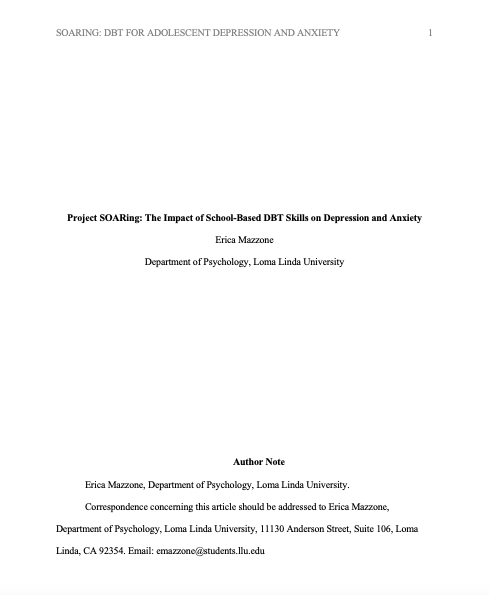Project SOARing: The Impact of School-Based DBT Skills on Depression and Anxiety

Depression and anxiety disorders present significant challenges to adolescents’ psychological, physical, social, and academic wellbeing. Young people from disadvantaged backgrounds are more likely to experience internalizing problems due to the chronic stress and emotion regulation difficulties associated with poverty-related risk-factors. Results from previous trials indicate that school-based programs are effective for the prevention and early intervention of depression and anxiety symptoms. Dialectical Behavior Therapy (DBT) is an evidence-based treatment that emphasizes acceptance and change strategies to facilitate development of four core skills: mindfulness, emotion regulation, interpersonal effectiveness, and distress tolerance. Although DBT skills have been adapted for use with adolescents to treat a variety of mental health problems, their effectiveness has not been sufficiently investigated in a school-setting. The purpose of this study is to assess the effectiveness of a school-based, DBT skills intervention for the early intervention of depression and anxiety symptoms in a diverse sample of 76 at-risk adolescents (59.2% female, 82.9% Hispanic/Latino) aged 15-18 attending a continuation high school. It was hypothesized that pre-post assessment comparisons would demonstrate (1) improvements in core skills and internalizing symptoms and that (2) increases in core skills would predict improvements in internalizing symptoms. Results from paired t-tests indicate a positive trend in improved DBT skills and internalizing outcomes following the intervention (ps < .05). Further, results of hierarchical multiple linear regressions indicated that increases in emotion regulation and interpersonal effectiveness predicted improvements in internalizing symptoms (ps < .05). These promising findings support the use of school-based DBT interventions to improve psychosocial outcomes in at-risk adolescents.



